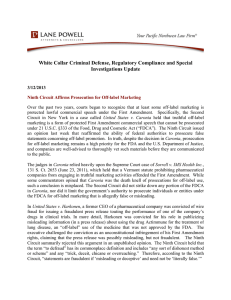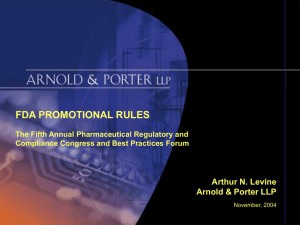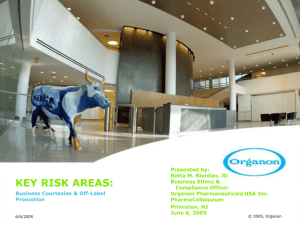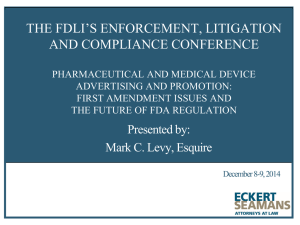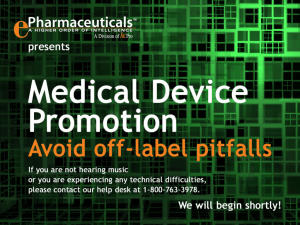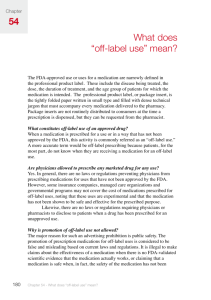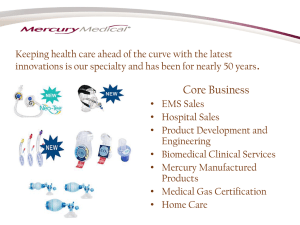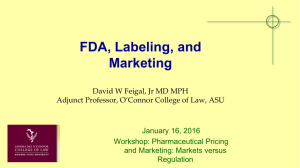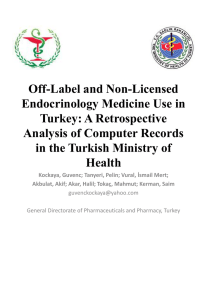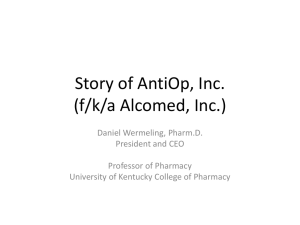Coleen-Klasmeier - Law & Economics Center
advertisement
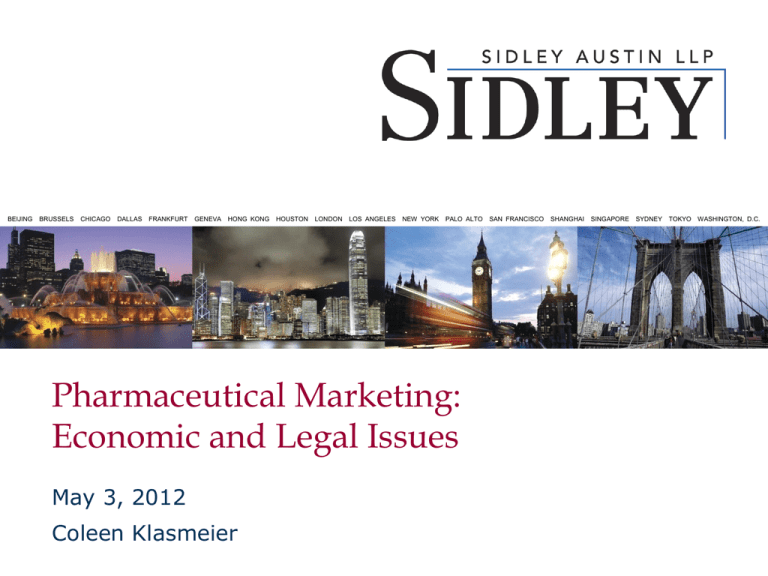
BEIJING BRUSSELS CHICAGO DALLAS FRANKFURT GENEVA HONG KONG HOUSTON LONDON LOS ANGELES NEW YORK PALO ALTO Pharmaceutical Marketing: Economic and Legal Issues May 3, 2012 Coleen Klasmeier SAN FRANCISCO SHANGHAI SINGAPORE SYDNEY TOKYO WASHINGTON, D.C. Off-Label Use • “Off-label use” = use that has not been approved or cleared by FDA – Sometimes (improperly) understood to include unlabeled dosing regimens, patient populations, use in combination, etc. • Generally lawful, common, and sometimes the standard of care 2 Off-Label Communications • If off-label use is lawful and common, it stands to reason that the communication of more, rather than less, truthful, non-misleading information about offlabel uses would benefit both physicians and patients • FDA has to some extent recognized the benefit of offlabel communications by manufacturers, establishing (at least) four “safe harbors”: – “Scientific exchange” (regulation) – Responses to unsolicited questions (Federal Register notice and pending draft guidance) – Dissemination of reprints (guidance) – Financial support for CME (guidance) • “Rules” are murky 3 Manufacturer Compliance Efforts • FDCA § 303(g) – Civil money penalties for false/misleading DTC – Factors affecting the calculation of penalties: • Did the person have the advertisement reviewed by qualified medical, regulatory, and legal reviewers before dissemination? • Did the person who created the advertisement or cause the advertisement to be created act in good faith? Any person holding an approved NDA or BLA “who disseminates or causes another party to disseminate a direct-to-consumer advertisement that is false or misleading shall be liable to the United States for a civil penalty in an amount not to exceed $250,000 for the first such violation in any 3-year period, and not to exceed $500,000 for each subsequent violation in any 3-year period.” 4 Manufacturer Compliance Efforts “AstraZeneca shall ensure that the Policies and Procedures address or shall continue to address: . . . review of promotional materials and information intended to be disseminated outside AstraZeneca by appropriate qualified personnel (such as regulatory, medical, and/or legal personnel) in a manner designed to ensure that legal, regulatory, and medical concerns are properly addressed during AstraZeneca's review and approval process and are elevated when appropriate. “ 5 Enforcement Environment • DOJ has continued to investigate and obtain settlements in numerous off-label matters: Company Allegations Abbott Laboratories Improper marketing of Depakote Settlement Amount $1.3 billion (civil and criminal) Date Announced Oct. 19, 2011 Johnson & Improper marketing of $158 million (civil) January 19, Johnson Risperdal 2012 GlaxoSmithKli Improper marketing and drug $3 billion (civil and Announced ne pricing criminal) Nov. 3, 2011 Genentech, Inc. Off-label promotion of Rituxan $20 million (civil) November 21, 2011 Pfizer Off-label promotion of Bextra $2.3 B March 20, and Celebrex 2009 6 Current Efforts to Seek Clarity • Citizen petition of July 5, 2011 – Submitted by Sidley Austin LLP and Ropes & Gray on behalf of seven medical product manufacturers – Requests clarity as to: • Scope of scientific exchange – Codification of preamble language – Parity with device regulations • Manufacturer responses to unsolicited requests • Dissemination of third-party clinical practice guidelines • Communications with payors about investigational products/new uses 7 Current Efforts to Seek Clarity • Communications and Activities Related to Off-Label Uses of Marketed Products and Use of Products Not Yet Legally Marketed; Request for Information and Comments, 76 Fed. Reg. 81,508 (Dec. 29, 2011). – In response to citizen petition, FDA has invited comments on “all aspects” of scientific exchange • Definition and characteristics of scientific exchange • Distinction from promotion • Application of safe harbor to medical devices • FDA, Draft Guidance for Industry: Responding to Unsolicited Requests for Off-Label Information About Prescription Drugs and Medical Devices, 76 Fed. Reg. 82,303 (Dec. 30, 2011) – Intended to “update and clarify” the policy, particularly in the context of emerging social media • “Unsolicited” = not “prompted in any way” • Novel recommendations for design and execution of responses • Discourages “public” responses 8 Parallel Developments in the Courts • Sorrell v. IMS Health – Vermont law restricted pharmacies and data-mining companies from disseminating—and manufacturers from using—physician prescribing information for marketing purposes, absent consent – Supreme Court held that, • “Speech in aid of pharmaceutical marketing…is a form of expression protected by the Free Speech Clause” • Content -and speaker-based burdens heightened scrutiny – “The fear that people would make bad decisions if given truthful information…[does not] justify content-based burdens on speech… [especially] when the audience, in this case prescribing physicians, consists of ‘sophisticated and experienced’ consumers.” 9 Parallel Development in the Courts • U.S. v. Caronia – Jazz Pharma sales representative accused of conspiring with a doctor to market XYREM® for use in “excessive daytime sleepiness” – District court rejected First Amendment challenges based on over breadth and ambiguity – Jury convicted Caronia of conspiracy to misbrand XYREM in October 2008 – Second Circuit sought supplemental briefing in light of Sorrell and decision is pending 10 Parallel Development in the Courts • Par Pharmaceuticals v. U.S. – Par markets MEGACE ES®, a treatment for AIDS wasting – Par filed suit seeking to enjoin FDA from applying its regulations in ways that criminalize truthful, nonmisleading, on-label communications to doctors in offlabel settings – Parties presently in discovery dispute 11 Recent Cases: First Amendment R.J. Reynolds Tobacco Co. v. FDA • District Court granted preliminary injunction against mandatory graphic images on cigarette packages • Government generally may not compel speech, except factual, uncontroversial information to prevent consumer confusion or deception 12 “Congress must pass laws, and the FDA must implement final rules, that are consistent with the requirements of the Constitution.” Answer • Where off-label use is “effective” (according to alternative standard): – Use is added to labeling (i.e., off-label use becomes labeled use), with presentation of supporting data, and full transparency as to the level of evidentiary support (e.g., “evidence of efficacy was derived from . . .” vs. “found effective”) – Promotion of use permitted – Would include comparative effectiveness information • Where off-label use is common – Dosing and risk information is added to labeling – Information would be included in promotion 13 Answer • Reinforces the importance of FDA review by providing for manufacturer submission of supplemental applications for a broader range of emerging uses than before • Could be implemented in part without any legislative change because they are already incorporated in FDA’s own regulations, but amendment to Section 505 ultimately necessary • User fees to facilitate rapid review of labeling supplements – Regulations permit unilateral labeling changes in some, but not all, off-label scenarios 14 Coleen Klasmeier 202-736-8132 cklasmeier@sidley.com 15
